Think of this as Volume 15, Number 20 of A-Clue.com, the online newsletter I've written since 1997. Enjoy.
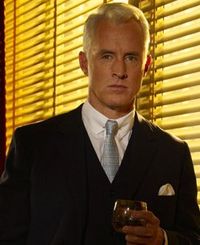
But what I've learned is that type of analysis is wrong. Sarah Palin isn't crazy because of Bush, or because there's some chemical in Wasilla setting us against one another.
What drives us crazy is economic change, which closes doors for those who can't adapt and opens doors for others.
The economic change now driving us is fundamental. The focus of economic growth has moved from the office to the campus.
Remember “The Organization Man” and “Mad Men?” Both saw offices as the centers of a new world, as the locus where money and power intersected.
Life was lived in two places, in “town” and at “home,” and these were separate. For folks who had based their lives on manufacturing, who had been taught by life that making stuff was key, this was impossible to accept. And we still have old lions who think that, because we don't make most of the world's goods, there's something wrong with us.
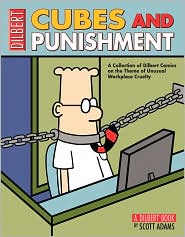
So the center of our economy has shifted, to the university campus. This has deep implications that can easily drive you crazy.
For one thing, on a campus there is little separation between working and living. Even if you're running or doing yoga you can be working out a problem. Your day is not tied to a single location – you move from place to place. Meals are part of the workday, bouncing ideas off people with different disciplines. It's deeply engrossing, consuming, and your need to be around other people grows.
College towns are insular, whether they're out in the country or in the middle of a city. Yet they're connected, to all other college towns, networked through societies and shared attitudes, shared challenges. A professor in Lincoln, Nebraska has a lot more in common with a professor in Boston, Massachusetts than his neighbors who work in offices, even Lincoln offices. Minds and values are different when you work in a college, even if the college is Oral Roberts.
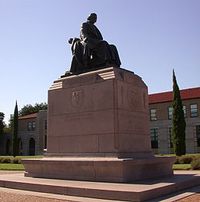
So college professors and students live close to campus. Students live on-campus, and professors live nearby. I used to think this was because colleges were nice places to be, but as I've witnessed the construction of new colleges downtown, I've seen there's more to it. Discovery is a multi-disciplinary endeavor. It's hard to find out new things when you're isolated, in cubicles, behind walls.
Work is play, but play is also work. Google looks more like a university campus than an office for a reason.
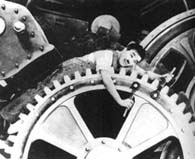
Which means central cities become more attractive. You want to be around those other minds all the time, that's what stimulates new thoughts, so isolating yourself in a car and a suburb is non-productive. As the pressure of university life rises, the time lost to commuting or a cul de sac becomes an increasing drain. Suburbs are no longer attractive.
Their cost is also rising.
Now let's look at this from the inside.
You've built your life around the suburb, the commute, the office. You have a world of “home,” with church, family, soccer games, and you have a world of “work,” close to the center, in an office or cubicle.
Its costs are rising, it's no longer the economic mainstream, those functions are being moved either offshore or to the Cloud. Your whole world is circling the drain.
What else can you do, in that case, but act out? You fight politically to pull power away from the cities. You resent universities and all open-ended inquiry. You tie yourself more closely to your church and your cul de sac. But now home values have collapsed, while those near universities have held steady. You lose your office job and your skills are obsolete, because there's no more need for middle management. You need to do something to prove your value, and what creates value now is discovery, which is being done almost exclusively in and around universities.
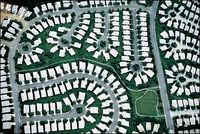
When places like Wasilla no longer make any economic sense, when commutes cost too much and office jobs are like factories were for your father, when absolutes have become barriers to inquiry and necessary growth, then everything you were taught was true seems false, and you're not going to be happy about it.
That's where today's crazy comes from. Those outside the Creative Class are where union factory workers were a generation ago, their lives and homes and attitudes are under siege, collapsing around them. What I have seen in my life as slow-motion, gradual change has become for them a tornado, and there's no place they can run to, no further suburb that will keep them safe from it.
Crazy becomes the rational choice. Reject change, put things back as they were, pretend the world can be as it was.
But that's crazy.










But also, the cost of entry to the Campus World, which all the office people saw as an absolute necessity for their kids to make it in the Real World, has exploded so that there are people with degrees flipping burgers and so debt-laden they may as well be tenant farmers or coal miners in debt to the Company Store. Which is, or should be, making our youth crazy. It sure has made the current adult generation crazy with frustration at being in a Catch-22 box!
But also, the cost of entry to the Campus World, which all the office people saw as an absolute necessity for their kids to make it in the Real World, has exploded so that there are people with degrees flipping burgers and so debt-laden they may as well be tenant farmers or coal miners in debt to the Company Store. Which is, or should be, making our youth crazy. It sure has made the current adult generation crazy with frustration at being in a Catch-22 box!
P.S. Your blog’s security program must be slipping. For once I could read the letters in the box without clicking “If you can’t read this, click here for an alternate.” THANKS!!!
P.S. Your blog’s security program must be slipping. For once I could read the letters in the box without clicking “If you can’t read this, click here for an alternate.” THANKS!!!
The problem is the burger flipping, not the education. Education, at its best, teaches you how to learn, and how to think. Learning and thinking are the way to progress.
You don’t go to school to learn a job and then go do the job. You go to school to learn to learn and then use that learning to build a career. A career consists of creating new value out of the learning process you’ve gone through, and you’re going through, every day.
More next week.
The problem is the burger flipping, not the education. Education, at its best, teaches you how to learn, and how to think. Learning and thinking are the way to progress.
You don’t go to school to learn a job and then go do the job. You go to school to learn to learn and then use that learning to build a career. A career consists of creating new value out of the learning process you’ve gone through, and you’re going through, every day.
More next week.
you helped me when no one else could!!!
Thank you so much for this tip!
you helped me when no one else could!!!
Thank you so much for this tip!
Its a great innovative thought of witnessing the construction of new colleges downtown and Discovery is a multi-disciplinary endeavor.I agree with your conclusions that It’s hard to find out new things when you’re isolated, in cubicles, behind walls.Thanks for sharing.
Its a great innovative thought of witnessing the construction of new colleges downtown and Discovery is a multi-disciplinary endeavor.I agree with your conclusions that It’s hard to find out new things when you’re isolated, in cubicles, behind walls.Thanks for sharing.